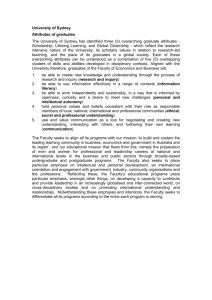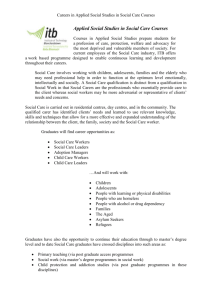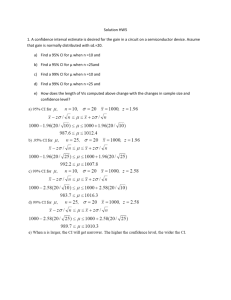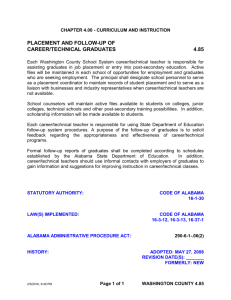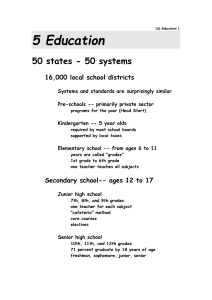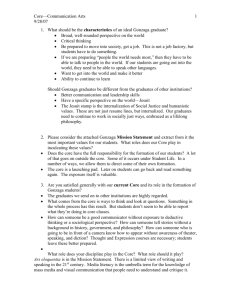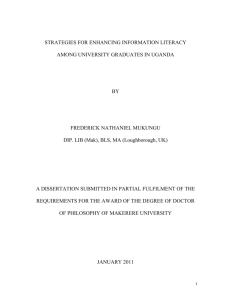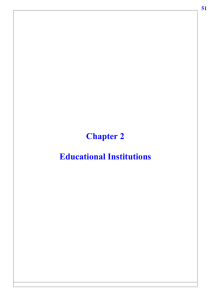Generic Attributes of Graduates of the Faculty
advertisement
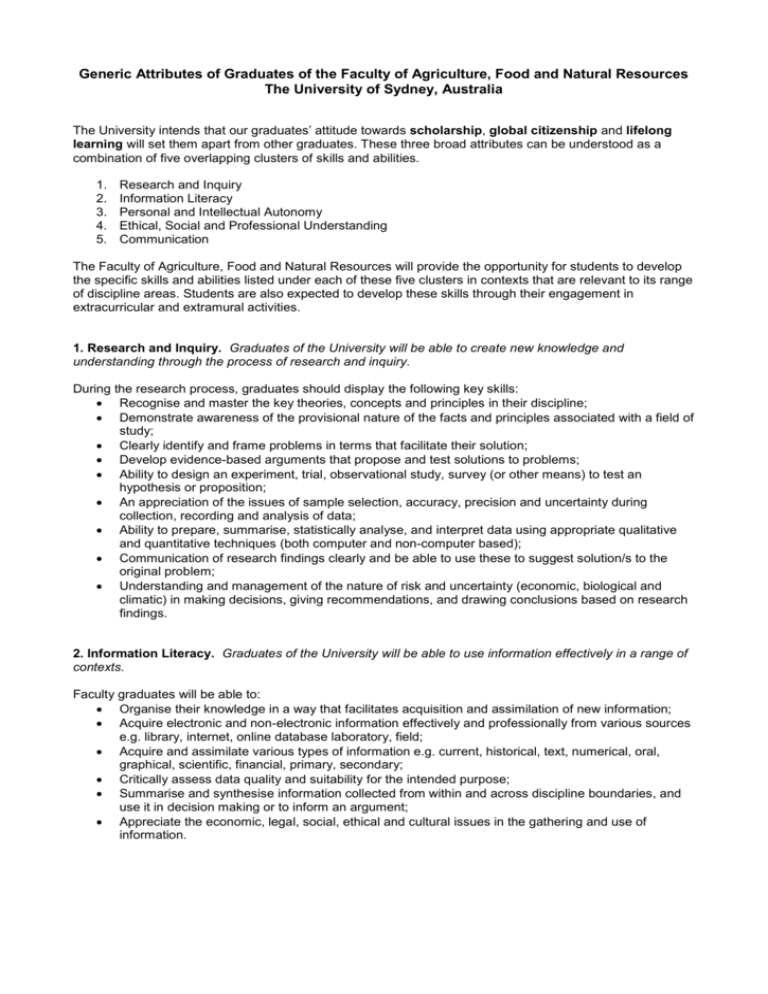
Generic Attributes of Graduates of the Faculty of Agriculture, Food and Natural Resources The University of Sydney, Australia The University intends that our graduates’ attitude towards scholarship, global citizenship and lifelong learning will set them apart from other graduates. These three broad attributes can be understood as a combination of five overlapping clusters of skills and abilities. 1. 2. 3. 4. 5. Research and Inquiry Information Literacy Personal and Intellectual Autonomy Ethical, Social and Professional Understanding Communication The Faculty of Agriculture, Food and Natural Resources will provide the opportunity for students to develop the specific skills and abilities listed under each of these five clusters in contexts that are relevant to its range of discipline areas. Students are also expected to develop these skills through their engagement in extracurricular and extramural activities. 1. Research and Inquiry. Graduates of the University will be able to create new knowledge and understanding through the process of research and inquiry. During the research process, graduates should display the following key skills: Recognise and master the key theories, concepts and principles in their discipline; Demonstrate awareness of the provisional nature of the facts and principles associated with a field of study; Clearly identify and frame problems in terms that facilitate their solution; Develop evidence-based arguments that propose and test solutions to problems; Ability to design an experiment, trial, observational study, survey (or other means) to test an hypothesis or proposition; An appreciation of the issues of sample selection, accuracy, precision and uncertainty during collection, recording and analysis of data; Ability to prepare, summarise, statistically analyse, and interpret data using appropriate qualitative and quantitative techniques (both computer and non-computer based); Communication of research findings clearly and be able to use these to suggest solution/s to the original problem; Understanding and management of the nature of risk and uncertainty (economic, biological and climatic) in making decisions, giving recommendations, and drawing conclusions based on research findings. 2. Information Literacy. Graduates of the University will be able to use information effectively in a range of contexts. Faculty graduates will be able to: Organise their knowledge in a way that facilitates acquisition and assimilation of new information; Acquire electronic and non-electronic information effectively and professionally from various sources e.g. library, internet, online database laboratory, field; Acquire and assimilate various types of information e.g. current, historical, text, numerical, oral, graphical, scientific, financial, primary, secondary; Critically assess data quality and suitability for the intended purpose; Summarise and synthesise information collected from within and across discipline boundaries, and use it in decision making or to inform an argument; Appreciate the economic, legal, social, ethical and cultural issues in the gathering and use of information. 3. Personal and Intellectual Autonomy. Graduates of the University will be able to work independently and sustainably, in a way that is informed by openness, curiosity and a desire to meet new challenges. Graduates will add significant value to their employing organisation and community because of a commitment to lifelong learning. This could be expressed in the following ways: Assuming responsibility for their continued learning; Stimulating their own intellectual curiosity, and having an ongoing commitment to learning from other people, life events, and various sources of information; Being open to new ideas, methods and ways of thinking; A willingness to employ creativity to propose innovative solutions to problems; Applying outcomes from critical evaluation of ideas and methods; Identifying and establishing goals (individual and collective),devising strategies to achieve these goals, and reviewing the progress towards their attainment; Taking responsibility for one’s actions, correcting mistakes, and reflecting on one’s own performance; A commitment to following through to the delivery of outcomes. 4. Ethical, Social and Professional Understanding. Graduates of the University will hold personal values and beliefs consistent with their role as responsible members of local, national, international and professional communities. A graduate of this Faculty will: Recognise the value of an individual, and respect their views, opinions and contribution regardless of background or status; Demonstrate honesty and integrity in all actions; Create trust through open and direct communications; Display an understanding of the roles of leadership, management, collaboration and accountability in an organisation; Appreciate their status as an alumnus of the Faculty of Agriculture, Food and Natural Resources, and the University of Sydney; Seek to understand the role and impact of agriculture and natural resource use in Australian society and the international community; Acknowledge the developmental role that creating a professional network plays in your own career path and the growth of your chosen discipline area; Be aware of the value of contributing to the community (local, national and international) through acts of service, and membership of relevant professional committees, societies and institutes. 5. Communication. Graduates of the University will recognise and value communication as a tool for negotiating and creating new understanding, interacting with others, and furthering their own learning. Faculty graduates shall have the capacity to: Communicate capably through common media such as academic writing, correspondence (for example, e-mail, letter and telephone); public speaking and promotional material (for example, brochures, websites and posters); Further their own learning through oral, written and visual communication; Communicate accurately, clearly, concisely, confidently and appropriately to a variety of audiences; Make effective use of written, visual and oral means to critique, negotiate and create understanding.


